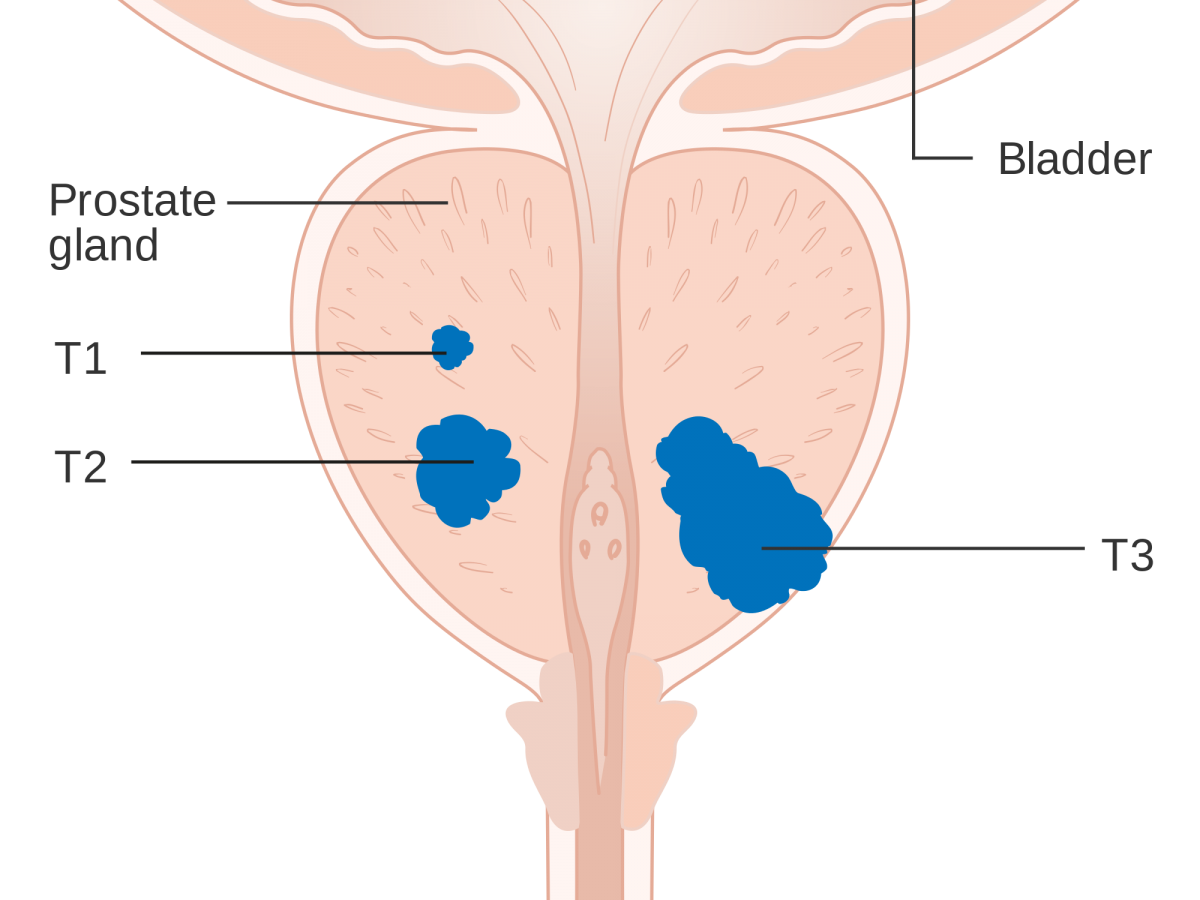Prostate Cancer affects almost a quarter of a million men annually in the United States making it the most common and prolific type of non-skin cancer that there is. The average age of men diagnosed with prostate cancer is around sixty-six (66) years old, and the disease rarely affects men aged forty (40) and under. According to the American Cancer Society, around 30,000 deaths will occur in the USA this year due to cancer of the prostate.
What is Prostate Cancer?
The prostate is a walnut-sized gland in younger men or a golf ball-sized gland in older men that is part of a man’s reproductive system. It surrounds the upper part of the urethra and is found below the man’s bladder and in front of his rectum. The prostate gland produces seminal fluid (the watery component of a man’s semen), plus also helps to regulate a man’s bladder control. Prostate cancer occurs when there are changes in the prostate cell’s DNA that result in cancerous growth. The most common type of Prostate Cancer is adenocarcinoma, however, there are also some rarer forms that occur: sarcomas, small cell carcinomas, neuroendocrine tumors, or transitional cell carcinomas.
Although women do not actually have a prostate gland, they do have what are known as Skene's glands. These are glands located on the anterior wall of the vagina (near the lower end of a female’s urethra) and are thought to produce a watery substance that may explain female “ejaculation”.
What Are the Risk Factors?
While there is not a specifically known cause of prostate cancer, there are certain risk factors that make one more susceptible to this disease than others. As an example, African American men are almost sixty percent (60%) more likely to be diagnosed with the condition than others ethnic groups.
Risk Factors for Prostate Cancer Include:
- Age - It can occur at any age but is rare in men 40 years and younger and most commonly found in men 60 years and older.
- Race/Ethnicity - African American men are more likely to be diagnosed with cancer of the prostate than White or Hispanic males.
- Genetics - Men with a relative that is blood related increases their chances two to three times of being diagnosed with Prostate cancer than those who do not.
- Diet - Those whose diets are high in saturated fats and red meat increase chances of diagnosis.
What Are the Symptoms?
Symptoms of prostate cancer may include some of the following:
- Blood in the urine (hematuria)
- Loss of bladder control
- Painful ejaculation
- Numbness in a patient's hips, legs, or feet
- Swelling in a man's legs or pelvic area
Keep in mind that not every patient that experiences these symptoms has cancer of the prostate. In fact, most men with prostate cancer have no symptoms at all and it is mostly found through screening with PSA testing by their doctor. As we’ve previously discussed, many men suffer from a condition known as BPH (Benign Prostatic Hyperplasia), or prostate gland enlargement. BPH is commonly seen in men as they get older, and the enlarged prostate gland can also cause uncomfortable urinary symptoms, such as those associated with prostate cancer. This is another reason that men over 60 years of age are strongly urged to have an exam preformed by a qualified Urologist.
How is Prostate Cancer Diagnosed?
If you have experienced any symptoms, such as blood in urine or loss of bladder control, call your doctor and make an appointment. First, a qualified Urologist will perform a routine physical exam followed by further screening tests if required. These tests may include:
- Digital Rectal Examination (DRE) - This rectal exam allows your physician to physically examine your prostate gland to see any abnormalities in the texture, shape or size of your gland.
- PSA (prostate specific antigen) Test - A blood sample is tested for PSA (which is produced by your prostate gland and is normally found in your blood). However, if the PSA level is abnormally high, this may indicate the possibility of having cancer of the prostate.
- Biomarker Test - These are non-PSA-based diagnostic tests for prostate cancer that may perhaps be more accurate than PSA testing. One example is the PCA3 that is specific for the prostate cancer antigen 3.
- Transrectal Ultrasound - In this procedure a tiny probe, is inserted into your rectum and the resulting sound waves are then utilized to recreate an accurate image of your prostate gland.
- Biopsy - A small sample of your prostate gland is collected using a thin needle and then analyzed to see if cancer cells are present.
- MRI Fusion - While still being developed worldwide, MRI Fusion may prove to be a very viable method to assist in prostate cancer diagnosis.
These tests will help your Urologist to determine what stage the cancer is in and additionally help determine what the correct treatment plan should be.
What is the Treatment?
Although cancer of the prostate is a serious disease, many men do not die from the disease. There is a 95% survival rate for those diagnosed when it's found early. Scheduling a routine screening is the best way to obtain a proper diagnosis and therefor increase your chances of survival by early detection and choosing the most appropriate treatment plan for you as an individual patient.
The treatment for an individual patient will primarily depend on the stage of the disease and the aggressiveness of the cancer cells. These possible treatments include:
- Surveillance and Monitoring- This is typically done when the Prostate Cancer is stage I. During this time the PSA blood levels are checked regularly. Many tend to take this treatment plan because Prostate cancer develops slowly.
- Brachytherapy- This is targeted radiation where radioactive seeds are placed into the prostate.
- Intensity Modulated Radiation Therapy- This is where radiation beams are used to target a specific region and shape. A benefit of this type of radiation is that healthy tissue exposure to the radiation is minimized due to the precision of the beams. A less intensive version of this therapy is named Conformal Radiation Therapy.
- Androgen Deprivation Therapy- This is a type of hormone therapy that reduces the effects of androgen, which are male hormones that promote the cancer growth.
- Chemotherapy- This may be a recommendation depending on how severe the Prostate Cancer is upon diagnosis.
Only your doctor can determine the best course of action to treat your cancer. If you are experiencing any of the above symptoms, or have a family history or other risk factors please call Philadelphia Urology at 215-563-1199 to schedule an appointment or simply contact us online today!
About Philadelphia Urology Associates
At Philadelphia Urology Associates, Dr. Bruce Sloane is a nationally renowned specialist in Men's Health issues and Age Management Medicine. Throughout Philadelphia and the surrounding areas, patients seek his expertise to treat prostate cancer and other urological issues such as premature ejaculation and erectile dysfunction. Using state-of-the-art equipment and having extensive specialized education and training, Dr. Sloane will find the treatments and solutions that will work for you.

